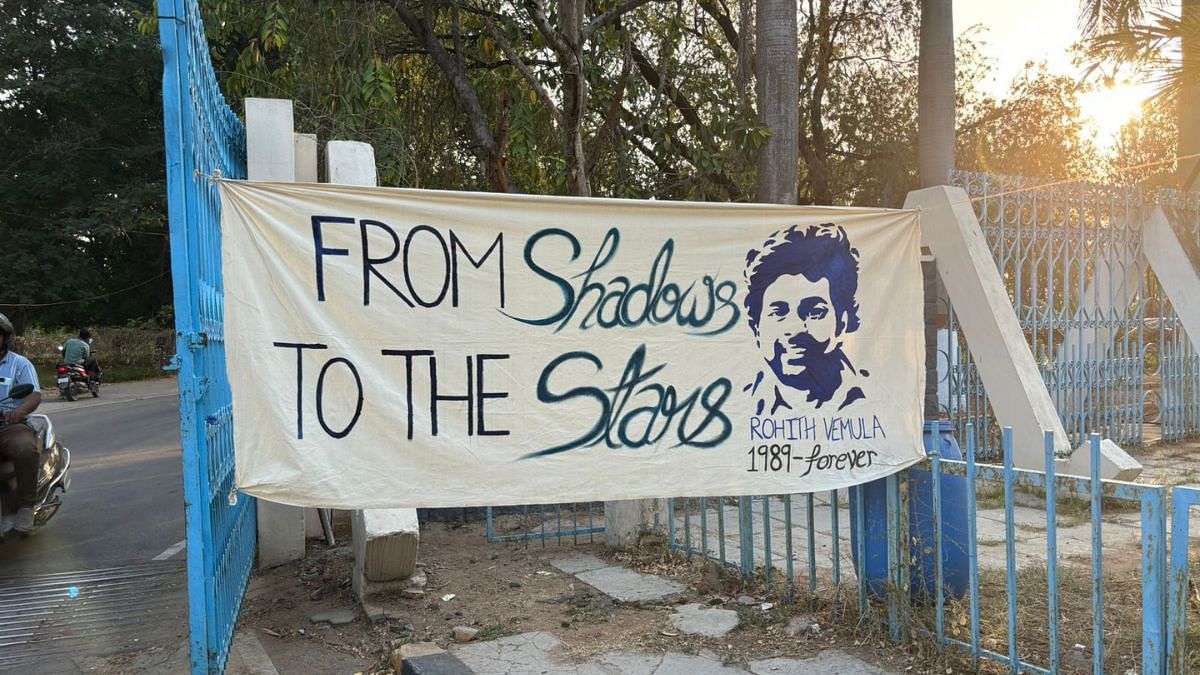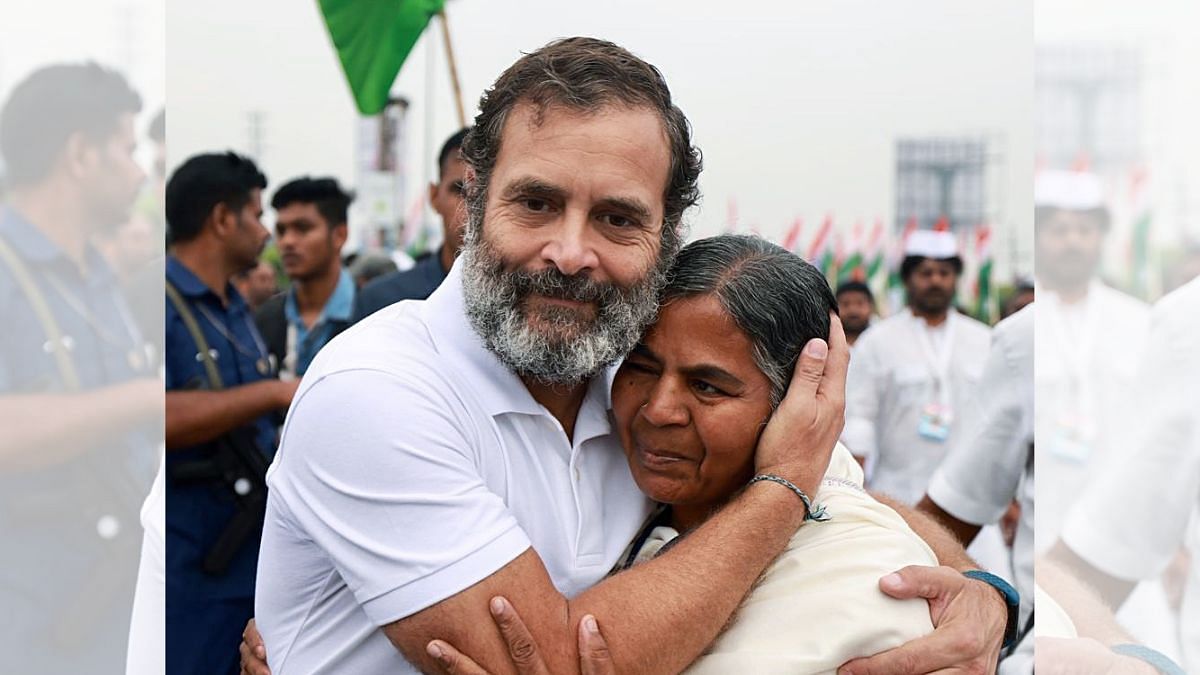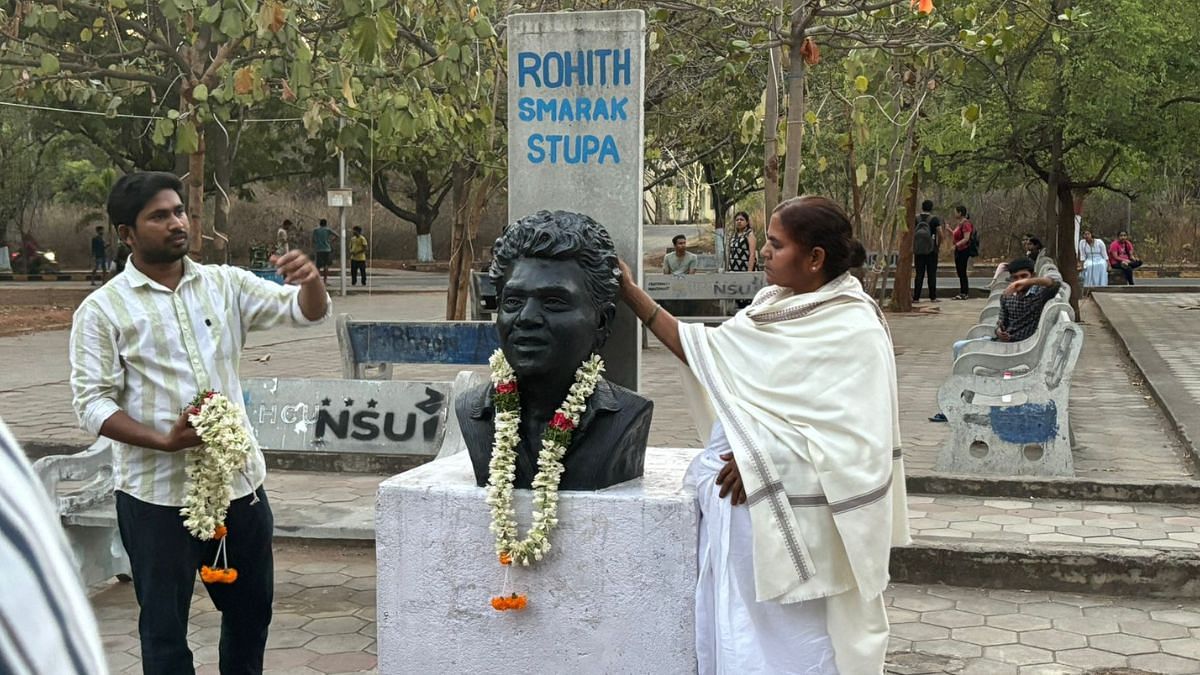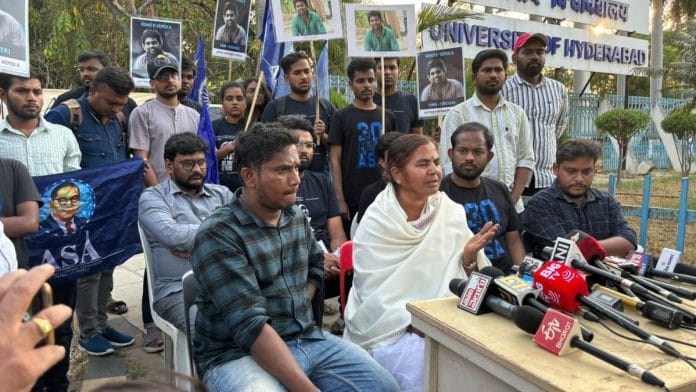Hyderabad: As Radhika and Raja Vemula — Rohith Vemula’s mother and brother — walked past the Congress headquarters in Hyderabad on 4 May, the sounds of a speech floated through the air. “What was done to Rohith Vemula was injustice!” a Congress leader thundered in Hindi, to loud cheers.
Both the mother and brother looked up at the mention but walked on, unrecognised. They don’t know who was giving the speech and seem to be unbothered by the dissonance of Rohith Vemula being used as a symbol in a political speech even as they are still reeling from the shock of the Telangana Police’s initial closure report on his death.
A day after the Telangana Police closure report concluded that Rohith, a PhD student of the University of Hyderabad, died by suicide because he was afraid his “real caste identity” would be revealed, the Vemula family met Telangana Chief Minister Revanth Reddy and Congress functionaries in Hyderabad before holding a press conference and attending a protest at the university.
“They keep trying to kill Rohithanna again and again,” Raja said, firmly. “But we have faith and believe that this government will deliver what they promised. People come and say many things. But we believe in Rahul Gandhi and the Congress.”
The chief minister spent just over 20 minutes with the family on the morning of 4 May, promising a fair and transparent investigation into the case, according to those who attended meeting with the CM.

The Director General of Police (DGP) of Telangana Police released a statement late on 3 May ordering a re-investigation into the case, after an uproar followed the filing of the initial closure report.
“The chief minister held my hands and said, ‘We’re with you. Without fail we’ll help you’,” Radhika Vemula told ThePrint. “I believe him. I felt happy and relieved to hear that.”
But, the real hurt and insult lie in the fact that the initial closure report dismissed the Vemula family’s Scheduled Caste identity, thereby denying their lived experiences and reopening wounds.
Some were also surprised that the Congress government was caught on the back foot regarding the case.
But, Rohith’s friends — who are all former student leaders at the University of Hyderabad and members of the Ambedkar Students Association (ASA) — lay the blame on a nexus between the police and members of the Bharatiya Janata Party (BJP) and the Rashtriya Swayamsevak Sangh (RSS). The motive, according to them, was to close the case before the elections end.
The closure report, submitted to the Telangana High Court, claimed that Rohith was not a Dalit and died by suicide because he was afraid his “real caste identity” would be discovered.
It also gave a clean chit to all accused — absolving then Secunderabad MP Bandaru Dattatreya, MLC N. Ramchander Rao and University of Hyderabad vice-chancellor Appa Rao Podile, besides Union Minister for Women and Child Development Smriti Irani and leaders of the Akhil Bharatiya Vidyarthi Parishad (ABVP).
“Our immediate response was shock,” said Raja Vemula, Rohith’s younger brother, on reading the police closure report. “We didn’t expect it.”
The police were meant to investigate whether or not the accused played a role in Rohith’s death by suicide, not investigate his caste status, according to the family and their lawyers.
The family made three demands of the CM — to reinvestigate the case, to look into false cases foisted on the other students who were suspended with Rohith, and to look into how the government can help rebuild the lives of these students, many of whom have been unable to get jobs since their involvement in the events that led to Rohith’s death and the protests that followed.
Also Read: Radhika Vemula is no grieving, compensation-seeking mother. And this scares the BJP
Politicisation of the case
The story of Rohith Vemula was always political — a reminder of how student politics on large campuses have far-reaching effects.
The former ASA members are clear that the ABVP was unable to accept the group’s dominance over the University of Hyderabad’s campus.
The year 2015 was like a golden period for Ambedkarite politics on campus — not only did the group have strong student leaders, but they were also widely popular across campus and able to win student elections independently.
They were a “formidable force,” according to former students, and also garnered support from Dalit, Leftist, and Congress factions across campus. This was the context behind Vemula’s targeting and harassment, eventually culminating in his death.
It’s a sequence of events that Rohith’s friends have gone over thousands of times — seared into their memory forever.
But what happened afterward — as their friend’s death by suicide on 17 January 2016 gained national attention — seems like a blur, as the movement snowballed. Both Radhika and Rohith’s friends remember the day his body was taken from campus — heavy police presence obstructing their access to their loved one.
Radhika wanted to be taken to the places her son used to spend time at, including a particular favourite spot on campus. She sat down, and simply said, “I want my son back,” Rohith’s friends told ThePrint.
It was at this moment that All India Majlis-e-Ittehadul Muslimeen (AIMIM) leader Asaduddin Owaisi entered campus to pay his respects. “What do you want?” the Hyderabad MP asked her. “I want my son back,” she repeated. “Just stick to that statement,” Owaisi told her. And that’s how the movement started, the friends added.
A few days later, Rahul Gandhi visited campus — not once, but twice, on 21 and 31 January.
In 2022, Rahul had invited Radhika Vemula to join the party, even walking with her during the Bharat Jodo Yatra.

In a resolution passed at its 85th plenary session in February 2023, the Congress promised to enact a law called the “Rohith Vemula Act” to “safeguard the right to education and dignity” for SC, ST, OBC and other minority groups.
The family has complete faith in him because they feel he cares. “We know that under this BJP regime, we won’t get justice — but we believe that with the help of the Congress, we’ll get justice,” said Raja.
“Despite the marginalised nature of the case, Rahul Gandhi’s unwavering commitment has galvanised the Congress, with leaders at all levels actively working towards achieving justice for Rohith Vemula,” said Munna, a friend and a fellow student leader from the Ambedkar Students Association.
“As a former president of the ASA, and having worked closely with Rohith Vemula during the 2015-17 ASA committee, I place my trust in Rahul Gandhi’s commitment to the cause.”
Shock over closure report
The family and friends’ faith in the Congress, and Rahul Gandhi above everything else, has been the mainstay of their battle — even as social media criticism lambasts the Congress government in Telangana for not being aware of the nature of the police closure report.
The timing of the report, just about two weeks before the state goes to polls on 13 May, has raised suspicions over why there was a hurry to close the case.
“The whole issue seems to be because of ulterior motives — it’s like we’ve been smelling in the air that the BJP is going to do something,” said one of Rohith’s friends, who was also suspended from the university in 2015.
The group gathered in Hyderabad on the morning of 4 May to meet with the chief minister.
They then began to plan their next steps — while Radhika and Raja rested at a friend’s place, Rohith’s other friends and former members of the ASA chalked out their plans over lunch. They were preparing for a protest and press conference at the university, and busy planning posters and press releases.
The talk at lunch switched between discussing the case and issues like the current state of university education across Telangana and Andhra Pradesh and the lack of young Ambedkarite student leaders on university campuses.
The group has barely slept in three days, since the closure report was first sent to one of them.
As Rohith’s friends and student leaders, their lives irrevocably changed after the events of 2015 and 2016, which suddenly thrust them into the national spotlight. Some of them haven’t been able to complete their PhDs or find jobs — the case hanging over their heads.
“Eight years later, the chargesheet is still pending — we filed an FIR, but no one was charged,” said one. “How can they just close this case like this? Even here I have to question the high court. We’re running up against all kinds of institutional injustice, and now Radhikaamma and Raja have to suffer the pain of their caste identity being denied.”
The group has remained committed to the ‘Justice for Rohith Vemula’ campaign, as their own lives have taken their course. Their friend Rohith Vemula is no longer simply a person they love — he is a symbol of much, much more.
And this is something his family has accepted as well.
“I feel pride when I hear my brother’s name like a rallying cry against injustice,” said Raja. “His case represents many things — starting from the Dalit movement to how the police and judicial system works.”
But they are careful to avoid overt connections between them and the Congress. They do not want anything from any politician, except justice. “We didn’t ask for any favours from the chief minister or any other politician,” said Raja.
Over the past eight years, they have received offers of help from various quarters — in terms of financial assistance, the promise of a house, or even political roles. But they’ve steered clear of such forms of help.
Raja now works as an advocate, while his mother still lives in their home in Guntur. “We don’t need such things. We don’t want it. What we want is justice,” he said.
Also Read: In Telangana, Rohith Vemula is no longer a political issue
Rohith Vemula as a symbol
Even Raja uses his brother’s full name in conversation. “He’s Rohith Vemula to us because he’s more than just my brother now,” he said. “As a family, we decided that we must fight for him — his death had shown us the path we needed to go down.”
But the family is also hurt by the various other allegations made in the police closure report, which seems to have been written in 2018 and not updated since.
“The many ways in which the report is trying to prove that Rohith is not an SC itself casts a doubt on the investigation,” said Prof. Sowmya Dechamma, Rohith’s friend who teaches at the University of Hyderabad. “Why should they try so hard to disprove his identity? The question is whether he was discriminated against and whether that led to his suicide.”
The report also alleges that Rohith was more concerned with student politics rather than his studies — a claim that his mother, especially, is hurt by.
At this point, eight years after her son’s death, Radhikaamma, as she is known, has completely resigned to her role in the public eye.
Dressed in white and wearing a white shawl despite the summer sun, she moves from party office to government quarters to press conferences with aplomb. She’s able to rest only during a 40-minute car ride to the university campus, closing her eyes and shielding her face from the sun.
When she gets out of the car, she is immediately engulfed by a crowd. She walks to the press conference outside the university gates, students and her son arranging themselves behind her, and confidently addresses the media — a banner of her son hanging in the background.
The case has thrust her into the spotlight, forcing her to grieve publicly. But she also knows that her son’s death has set in motion a fight against caste discrimination that’s much larger than her family’s.
“He lived as an SC, studied as an SC, discriminated against as an SC, suspended as an SC,” she told ThePrint. “Now suddenly he’s not an SC?”
She still has nightmares over her son’s death, even as she has become a symbol of resistance. While she’d never been to the campus before, she and Raja have had to visit the University of Hyderabad countless times since 2016.
During 2016 and 2017, she visited the campus every week, and now, she’s recognised by everyone there.
She and Raja have barely had a moment to rest since they received the closure report. Another friend of Rohith’s said that she’s not sure if Radhikaamma has had the time to fully process the report, and all the ways in which it insults Rohith and her family.
But Radhikaamma’s strength shines through the obvious distress of nearly a decade of fighting for justice for her son.
The entire ‘Justice for Vemula’ campaign has rallied around her, and everyone is like family to her and Raja. And she treats them as such as well, including Rohith’s friends and journalists, who have covered the case since the very beginning.
One of Rohith’s friends has recently been married, and Radhikaamma rushes to greet his wife right after the press conference and give them her blessing.
Neel Salam chants a group of students as she walks up to the bust of Rohith that now stands on campus grounds. She caresses the head, looking lovingly at her son’s face cast in black stone, a fresh garland of flowers around his neck.

After a while, she turns and faces the crowd of students, and smiles encouragingly back at those who’ve stood by her since she lost him.
(Edited by Richa Mishra)
Also Read: The IITs have a long history of systematically othering Dalit students






